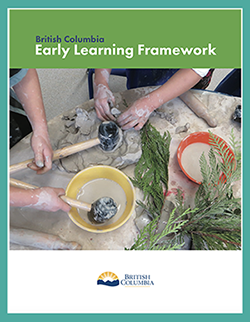Module 1: The Principles of Early Learning
What’s New in the Early Learning Framework?
The revised Early Learning Framework
- Expands the focus to include children from birth to age eight (Grade 3)
- Connects ideas about early learning with the B.C. curriculum
- Inspires educators working with children from birth to age eight, in early learning settings, and schools
- Talks about the impacts of colonization
- Encourages reconciliation with Indigenous people
- Honours Indigenous authorities in education
- Strengthens the idea of Inclusive learning and care spaces and practices for all children. This includes children with diverse abilities and needs
- Describes learning as a holistic process
- Introduces language that may be new to some educators. This is intentional. The use of new language can inspire new conversations and ways of thinking
- Uses the terms “living inquiries” and “pathways.” These terms help describe the thinking, doing, and learning that happens as children, educators, materials, and ideas work together
Using the Early Learning Framework
The framework is designed for use by
- Early Childhood Educators
- Primary school teachers/educators
- Principals and vice-principals
- College and university educators and researchers
- Post-secondary students in early childhood and elementary education programs
- Pedagogists
- Other early years professionals
- Communities, governments, and families
